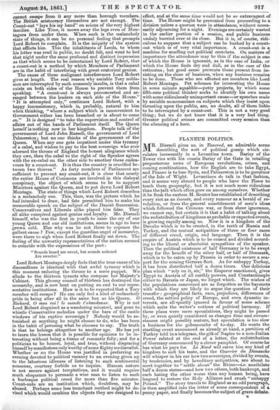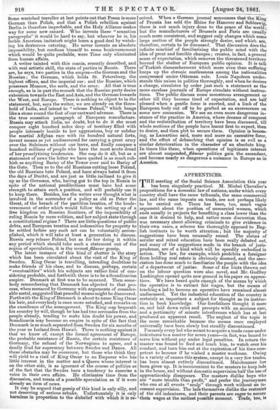FLANEUR POLITICS.
. Disraeli gives us, in Tancred, an admirable scene describing the sort of political gossip which cir- culates incessantly in a Levantine town. Barizy of the Tower vies with his cousin Barizy of the Gate in retailing preposterous news of European revolutions, crises, and coming combinations, how the English are to take Egypt, and France is to lose Syria, and Palmerston is to be governor of the Isle of Wight. Levantines do talk in that fashion, and it seems very absurd to people who have the Times to teach them geography, but it is not much more ridiculous than the talk which often goes on among ourselves. Whether it be from the custom M. Reuter has established of describing every riot as an 6meute, and every rumour as a herald of re- volution, or from the general unsettlement of men's ideas which followed the Crimean war, or from sheer ignorance, we cannot say, but certain it is that a habit of talking about the redistribution of kingdoms as probable or expected events, is growing rapidly among us. Now it is a kingdom of the Danube which is to be created, in the teeth of Russia and Turkey, and the mutual antipathies of three or four races of different creed, origin, and language. Then it is the empire of Austria which is to be erased and divided accord- ing to the liberal or absolutist sympathies of the speaker. Then the political existence of half Germany is to be swept away for the benefit of the other half, or half of Denmark, which is to be eaten up by Prussia in order to secure a sea- port for the coming German fleet. As for unhappy Turkey, it has been distributed half a dozen times. One delicious plan which " rely on it, sir," the Emperor sanctioned, gives Egypt to Austria of all earthly powers, and Constantinople either to Bavaria or Japan, we forget which. The wishes of the populations concerned are as forgotten as the bayonets with which they are likely to argue the question of their transfer : geographical facts, race, prejudices, differences of creed, the settled policy of Europe, and even dynastic in- terests, are all quietly ignored in favour of some scheme which suits the writer's notions of political harmony. If these plans were mere speculations, they might be passed by, or even quietly considered as changes time and circum- stances might possibly mature, but speculation is too slow a business for the gobemouche of to-day. He wants the startling event announced as already at hand, a partition of Turkey told in a telegram, the gift of Naples to a non-Italian Power related at the end of a letter, the redistribution of Germany commenced by a, clever pamphlet. Of course he has what he pays for. Le Nord will carve him any kind of kingdom to suit his taste, and the Courrier du Dimanche will whisper in his ear how two sovereigns, divided by events, by tendencies, and by hereditary antipathies, are about to meet together to " settle about" the Rhine—i.e. annihilate half a dozen states—and how two others, both bankrupt, and each hating the other worse than any human being, have leagued to restore the Holy Alliance and crush " unhappy Poland." The story travels to England as an odd paragraph, is then amplified into the letter of some correspondent of a penny paper, and finally becomes the subject of grave debate. Some wretched traveller at last points out that Posen is more German than Polish, and that a Polish rebellion against Berlin is therefore improbable, and the Holy Alliance makes way for some new canard. Who invents these " sensation paragraphs" it would be hard to say, but whoever he is, his feeble American imitator's might learn a good deal by watch- ing his dexterous catering. He never invents an absolute impossibility, but confines himself to some bouleversement which would be quite probable, were Time only eliminated from human affairs.
A writer tainted with this mania, recently described, and with real artistic skill, the state of parties in Russia. There are, he says, two parties in the empire—the German and the Russian ; the German, which holds St. Petersburg, the highest offices, and the imperial ear; and the Russian, which possesses Moscow, the serfs, and the army. All that is true enough, as is in part the remark that the Russian party desire extension towards the East and Asia, and the German towards the West, and Europe. There is nothing to object to in the statement, but, says the writer, we are already on the thres- hold of India, and intend to " release Poland," which hangs like a stone round the foot of our eastward advance. There is the true sensation paragraph of European manufacture. Russia may attack India, no doubt, but to do it she must conquer eight hundred miles deep of territory filled with people intensely hostile to her aggressions, buy or subdue the martial Affghan race with its hundred natural forts, invent means as yet undiscovered for carrying a great army over the Suleiman without our leave, and finally conquer a hundred millions of people who have the most acute dread of her proselytizing tendencies. She may do it all, but as a statement of news the letter we have quoted is as much rub- bish as anything Barizy of the Tower ever said to Barizy of the Gate. Then as to the old Russians cutting loose Poland, the old Russians hate Poland, and have always hated it from the days of Dmitri, and are just as little inclined to give it up as the Germans, who, having got to the top in Russia in spite of the national predilections must have had some strength to attain such a position, and will probably use it to keep there. Besides, has the writer ever thought what is involved in the surrender of a policy as old as Peter the Great, of the breach of the partition treaties, of the boule- versement of order which would follow the setting up of a free kingdom on Russian frontiers, of the impossibility of ruling Russia by mere volition, and her subject state through a constitutional regime ? There are little questions of public debts, and European treaties and indemnities for property to be settled before any such act can be voluntarily accom- plished, which it will take at least a generation to discuss. R,' ussia may release Poland, but as for her doing it within any period which should take such a statement out of the region of speculation, it is the merestAneur gossip. The latest instance of this kind of chatter is the story which has been circulated about the visit of the King of Sweden. King Oscar is travelling, intending doubtless to make friends of his class, and to discuss, perhaps, certain " eventualities" which his subjects are rather fond of con- sidering probable, and forthwith there is to be a Scandinavian empire. Denmark at first was to be annexed. Then some- body remembering that Denmark has objected to that pro- cess, when menaced by Germany with arguments of consider- able metal, suggested that peaceful means might be discovered. Forthwith the King of Denmark is about to name King Oscar his heir, and everybody is once more satisfied,and remarks on the excellence of the arrangement. The King may bequeath his country by will, though he has had two serenades from the people already, tending to make him doubt his power, and Scandinavia may become an empire in spite of the fact that Denmark is as much separated from Sweden for six months of the year as Iceland from Hawaii. There is nothing against it that we know of, except the formal agreement of Europe, the probable resistance of Russia, the certain resistance of Germany, the refusal of the Norwegians to agree, and a deadly feud for supremacy betWeen Swedes and Danes. All these obstacles may be overcome, but those who think they will yield to a visit of King Oscar to an Emperor who has little interest in the matter and a Queen whose interest is on the other side, is as ignorant of the course of politics as of the fact that the Swedes have a tendency to exercise a voice in their own affairs. He eliminates time from the discussion, and treats of a possible speculation as if it were already an item of news. It may be argued that gossip of this kind is only silly, and not deserving of serious rebuke. Unfortunately it is only harmless in proportion to the disbelief with which it is re- ceived. When a German journal announces that the King of Prussia has sold the Rhine for Hanover and Schleswig, there is not much injury done to the peace of the world ; but the manufacturers of Brussels and Paris are usually much more consistent, and suggest only changes which some large section of the people strongly desire, and which are, therefore, certain to be discussed. That discussion does the infinite mischief of familiarizing the public mind with the idea of great and forcible changes ; creates, in fact, a general sense of expectation, which removes the threatened territory beyond the shelter of European public opinion. It is talk of Turkish dismemberment which more even than suffering keeps up the chronic restlessness among the nationalities compressed under Ottoman rule. Louis Napoleon under- stands this axiom in politics thoroughly, and when he desires a change, circulates by order just such a statement as the more careless journals of Europe circulate without instruc- tions. The public discuss some monstrous arrangement or other till they become tired of expectation, and are half pleased when a gentle force is exerted, and a limb of the European body cut off to be grafted as an excrescence on some new connexion. We see an even more dangerous in- stance of the practice in America, where dreams of conquest and the redistribution of territory have been discussed, till whole sections of the people have learnt first to expect, then to desire, and then plot to secure them. Opinion is becom- ing, as Lamartine said, more and more an executive force, and the effect of debauching that opinion is as evil as a similar deterioration in the character of an absolute king. In times like these, when operations of legitimate interest are almost suspended, fliineur politics gain the ascendant, and become nearly as dangerous a nuisance in Europe as in America.































 Previous page
Previous page